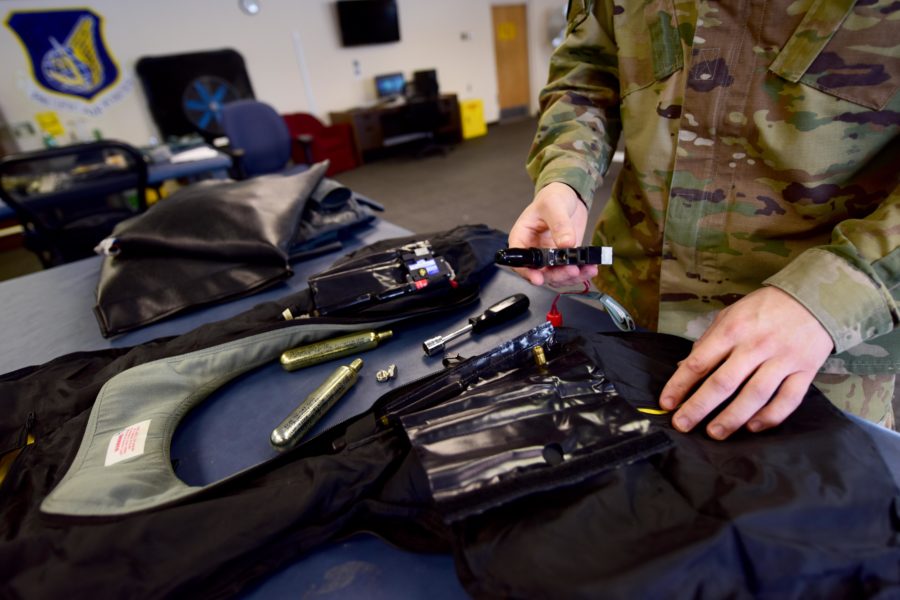Aircrew flight equipment Airmen face deep problems maintaining proficiency, largely stemming from inadequate training and high operations tempo, and the Air Force should respond by expanding the number of personnel and overhauling the career field’s progression, according to a new report.
Air Combat Command tasked RAND Project Air Force to investigate the causes of deficiencies within the AFE career field because of continued problems that rose to the level of command leadership, the organization wrote in a 150-page report published March 17.
Airmen in the AFE career field, established in 2008 with the merger of the aircrew life support and survival equipment Air Force Specialty Codes, are in charge of outfitting pilots, aircrew, and special warfare operators with life support and other flight equipment.
“In light of the direct impact that AFE personnel have on aircrew safety, maintaining a high level of performance of its personnel is of great concern to Air Force leadership,” the report states. “Yet performance problems among AFE personnel have surfaced repeatedly over the past several years, raising concerns that the process for maintaining the proficiency of AFE personnel is in need of a major overhaul.”
RAND visited eight USAF bases across multiple commands and conducted dozens of focus groups and other discussions with AFE Airmen to determine the problems. The report finds that the Airmen’s on-the-job training is not meeting their needs, largely because of curriculum problems and inexperienced trainers. These issues come up early in an Airman’s career and continue at units across the command.
“Tech school is, I don’t want to say useless, but kind of,” one Airman told RAND, explaining that taking leave after learning the basics means there is a “brain dump. … It’s hard not to. As far as proficiency, tech school doesn’t help. We need to be able to go to the base and learn what you have.”
At the bases, there are inexperienced instructors conducting training, which continues the problem of low proficiency. Noncommissioned officers and junior superintendents are not very experienced in some of the areas they oversee, which is often the result of moving between mission areas—such as from supporting fighters to supporting bombers.
“When I got here, I started from knowing very minimal,” another Airman said. “When I was getting into the training, it felt like the people training me almost didn’t know how to do it. There wasn’t an organization or a method to doing it. … I could feel a lack of confidence in their own knowledge and I didn’t realize until I got to the point where I am how poor that training was.”
Issues with the syllabus mean Airmen are teaching things that are outdated and “a lot of stuff that is unnecessary,” an Airman said.
Airmen in AFE units must complete a “high volume of tasks,” which is causing low morale, the report states.
“We just don’t have time,” an Airman said. “In every section that’s the reality. We have various tasks. It’s just not feasible to get everything done and train among the ops tempo.”
“Unless there is an uptick of manning and decrease in ops tempo, we are going to have proficiency problems,” another Airman added.
Going forward, RAND recommends
- The Air Force work to reduce the burden and “skill gap” of Airmen caused by moving personnel across the missions by adding more manpower and eventually “shredding” the career field, for example by separating fighter AFE from bomber AFE.
- Units need to reduce the burden and lack of skills caused by moving between shops on an ad hoc basis by developing a strategy to govern the process.
- The Air Force needs to “change how training is managed and resourced” to address the issues with the syllabus and inexperienced trainers.
- Leaders need to be set up to succeed by assigning them to sections aligned with their experience, the report states.
RAND experts noted that AFE is one of the only enlisted-only career fields in the entire Air Force, which means there is a problem of advocacy across the service without officers. USAF could develop a “select set of officers with AFE-specific expertise and experience.”
“The intent would be to produce officers who would be well situated as advocates for the career field and who could ensure a long-term investment in the AFE career field beyond the tactical level of leadership and execution,” the report states.
